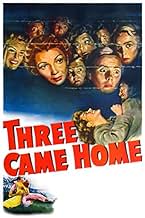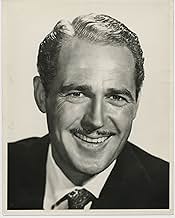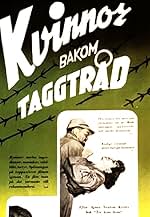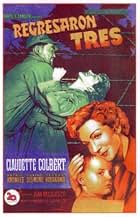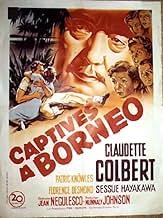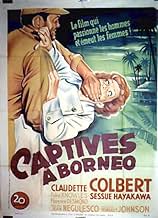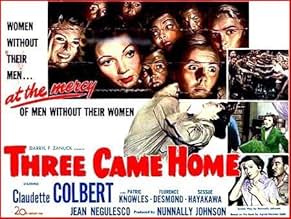During Word War II, American author Agnes Newton Keith is imprisoned by the Japanese in various POW camps in North Borneo and Sarawak.During Word War II, American author Agnes Newton Keith is imprisoned by the Japanese in various POW camps in North Borneo and Sarawak.During Word War II, American author Agnes Newton Keith is imprisoned by the Japanese in various POW camps in North Borneo and Sarawak.
- Director
- Writers
- Stars
- Awards
- 3 wins & 1 nomination total
- Elderly Resident
- (uncredited)
- English Girl
- (uncredited)
- English Radio Announcer
- (uncredited)
- English Radio Announcer
- (uncredited)
- Japanese Soldier
- (uncredited)
- Woman Prisoner
- (uncredited)
- Englishman
- (uncredited)
- Dr. Bandy
- (uncredited)
- Japanese Soldier
- (uncredited)
- Director
- Writers
- All cast & crew
- Production, box office & more at IMDbPro
Featured reviews
On the screen and in real life Keith was a novelist who faithfully recorded oriental life with some empathy in her books. That got her some favorable treatment from the Japanese, in the film in the form of an ally of sorts in a colonel played by Sessue Hayakawa.
Hayakawa's performance is the highlight of the film. It may very well have been the first time post World War II that a Japanese character was given three dimensions. Of course the brutality of the Japanese prison camps is also shown in the best tradition of that other World War II film Sessue Hayakawa did, The Bridge On The River Kwai.
1950 was definitely the year for women in stir. A few weeks before this film came out, MGM released Caged which certainly has some of the same themes as Three Came Home. Of course the big difference is that over at MGM the women were criminals in a civilian setting.
Three Came Home directed by Jean Negulesco who normally did lighter material than this, holds up very well for today's audience. Colbert, Knowles, and Hayakawa do some of their best screen work here and definitely try to catch this one when broadcast.
We know from Sessue Hayakawa's cultivated Japanese colonel that Hollywood is changing its perceptions of our former enemy. Cruel stereotypes do continue (presumably based on fact), but the colonel's character is humanized to an unusually sympathetic degree-- even his loss in the recent atomic bombing of Hiroshima is mentioned. Then too, it's well to remember that during the war our government interned US citizens of Japanese extraction in pretty inhospitable camps along the eastern Sierras, and probably illegally so.
Anyway, the movie has the look and feel of the real thing, while the producers should be saluted for using as many actual locations as possible. The fidelity shows. Since the story is the thing, the cast appropriately has no stars except for Colbert, which helps produce the realistic effect. There are a number of riveting and well-staged scenes. But the staging of the final crowd re-union scene strikes me as particularly well done. And, of course, there's that final heart-breaking view of the hilltop that still moves me, even 60 years later. All in all, this is the old Hollywood system at its sincere and de-glamorized best.
So, unlike the first commentator on this film, I was actually pleased by the balance in its presentation. For although these days of Ozzie and Harriet rarely projected overt brutality realistically onto the screen, this film does provide a palpable sense of the suffering endured by European prisoners of war. At the same time, it did not end on this note: one of the more powerful Japanese camp directors suffers a loss in his family due to the Hiroshima bombing. And it is this counterbalance later in the film which I think causes me to disagree with the first commentator's view that this is something of a propaganda film.
Several things about this film stand out to me as justly bold for that era of film-making:
*an attempted rape is portrayed as well as a realistic presentation of its consequences. Accordingly, a complex moral lesson is imparted to the audience: far more complex, I might add, than the lessons Hollywood chooses to impart in many contemporary films with respect to such events. Perhaps this is simply an accident of the narrative being based on true events.
*the main character is a woman who is educated, brave and yet sympathizes with Asian culture (she is a scholar who has published an anthropological study which had been translated into Japanese) even if she vehemently opposes Japan's aggression.
*Hiroshima and the firebombings of Tokyo are presented from the Japanese viewpoint as horrific events and their effect in this movie is to engender sympathy for the ambiguous figure of the camp commander.
Of course this is still a Hollywood movie of the 50s and some of the behavior seems stilted and implausible to contemporary audiences. But compared to some other films made then - or even today - it is a breath of fresh air. I never expected to watch this whole film but was quite happy I did. I highly recommend it to others (which is why I bothered to write this!) as a date movie (in spite of the subject matter the strong female character and love story recommend it here) or a film to show children over ten (get a map so the child can locate Borneo) to introduce them to the many moral and political questions arising out of the war in the Pacific. Enjoy!
Did you know
- TriviaAgnes Newton Keith, the writer of the book on which this film was based, wrote a letter about the film and its critical response. The letter was published in 'The New York Times' on 26 March 1950. It reads: "...I find that one or two critics (not 'The New York Times') question why the story was written....I wrote 'Three Came Home' for three reasons: For horror of war. I want others to shudder with me at it. For affection of my husband. When war nearly killed me, knowledge of our love kept me alive. And for a reminder to my son. I fought one war for him in prison camp. He survives because of me....The Japanese in 'Three Came Home' are as war made them, not as God did, and the same is true of the rest of us."
- GoofsColonel Suga says he attended the University of Washington for four years and Agnes reveals that she attended Berkeley. Suga goes on to say that Cal "murdered" Washington's football team. However, Tatsugi Suga arrived at Washington in 1924 and during the next four seasons California never defeated Washington. Only one football game would fit Suga's description: a 33-0 loss in 1933.
- Quotes
[first lines]
Agnes Newton Keith: Six-degrees north of the Equator, in the heart of the East Indies, lies Sandakan, the tiny capital of British North Borneo. In Sandakan in 1941, there were 15 thousand Asiatics, 79 Europeans, and 1 American. I was the American. My name is Agnes Keith. I was born in Oak Park, Illinois, and graduated from the University of California at Berkeley. My husband is Harry Keith, a colonial official of British North Borneo. Borneo became my home when Harry and I were married. And it was in Sandakan that I bore one child, and lost another. And it was in Sandakan that we waited - 45 white men, 24 wives, and 11 children - through the anxious days of 1940 and '41. Certain only of one thing: that sooner or later, Japanese guns would join in the thunders of war, and Japanese troops would come down through the East Indies. The men waited because it was their duty; the women because it was their choice.
- ConnectionsEdited into Your Afternoon Movie: Three Came Home (2023)
- SoundtracksYou Say the Sweetest Things (Baby)
(uncredited)
Music by Harry Warren
Played on the radio before and after the news flash regarding Pearl Harbor
- How long is Three Came Home?Powered by Alexa
Details
Box office
- Gross US & Canada
- $1,900,000
- Runtime1 hour 46 minutes
- Color
- Aspect ratio
- 1.37 : 1
Contribute to this page


